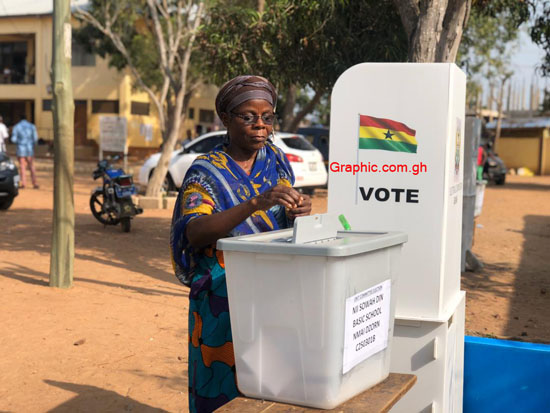Since the maiden edition of the Afrobarometer Survey in 1999, Ghanaians have been asked, “Do you feel close to any particular political party?” If the answer is yes, the respondent is asked, “Which party?” Over nine rounds of the survey, the percentage of Ghanaians describing themselves as feeling close to a political party has declined from a high of 67 per cent in 1999 to 48 per cent in 2022.
Majority (nine out of 10) of those who say they feel close to a particular party identify the National Democratic Congress (NDC) or the New Patriotic Party (NPP) as that political party. I use feelings of closeness to a particular political party as a measure of partisanship. How then does partisanship shape the perceptions of citizens on matters of governance and politics in Ghana?
Partisanship and perceptions of institutions
Partisanship affects our trust and perceptions of corruption in institutions. Ghanaians tend to trust institutions more when the party they feel close to is in power than when it is in opposition. The trust issue is further worsened by the perceptions of corruption in institutions. Afrobarometer regularly asks, “How many of the following people do you think are involved in corruption, or haven’t you heard enough about them to say?”, with the response of choices of none of them, some of them, most of them, and all of them.
Partisans tend to differ here as well. For example, there is a tendency to say fewer people are involved in corruption when the party one feels close to is in power and say the opposite (more people are involved in corruption) when in opposition. This is especially true in the case of elected institutions — the Presidency and Parliament.
Partisanship and evaluation of government performance
Ghanaians are regularly asked to evaluate how government is performing in handling a number of important issues — job creation, addressing education needs, improving basic health services, providing water and sanitation services, fighting corruption, improving the living standards of the poor, providing infrastructure, among others.
In their assessments, government performance is rated more positively when the party one feels close to is in power. For example, those who say they feel close to the NDC evaluate government’s job creation efforts by an overall positive margin of 59 per cent (when NDC is in power) to 35 per cent (when the NDC is in opposition). Consider the reverse where those who feel close to the NPP evaluate government’s job creation efforts by an overall margin of 61 per cent (when NPP is in power) to 13 per cent (when the NPP is in opposition). The pattern is very similar across other public policy areas.
Partisanship and evaluation of election outcomes
In Round 3 (2005), the survey began asking citizens to evaluate the freeness and fairness of the most recent election held in the country. In Rounds 3 & 4 (2005 & 2008), the reference point was the 2004 election. In Round 5 (2012), the reference point was the 2008 election. In Round 6 (2014), the reference point was the 2012 election. In Rounds 7 & 8 (2017 & 2019), the reference point was the 2016 election.
Election outcomes are seen as freer and fairer when the party one feels close to wins. In evaluating the 2004 election which the NPP won, 70 per cent of those who described themselves as feeling close to the party said the election was completely free and fair compared to only the 35 per cent of those described themselves as feeling close to the NDC.
In evaluating the 2008 election, which the NDC won, only 30 per cent of those who described themselves as feeling close to the NPP deemed the election free and fair, compared to 54 per cent of those NDC partisans who said same.
In Round 6 (2014), the reference was the 2012 election, which the NDC won, and only 12 per cent of NPP partisans said the election was completely free and fair compared to 49 per cent of NDC partisans who said same. In Rounds 7 & 8 (2017 & 2019), the reference was the 2016 election which the NPP won. Seventy-eight per cent of NPP partisans said the election was completely free and fair, compared to 49 per cent of NDC partisans who said same.
The way forward
In a multiparty democracy, the development of strong attachments to political parties is expected. In short, partisanship is unavoidable. However, when partisanship begins to shape perceptions on certain fundamental matters of governance, it becomes a matter of concern.
One of the ways in which partisan feelings can be moderated is the constant presence of mediating voices in our public spaces. These voices can strive to serve as impartial arbiters and a check on our partisan passions.
The writer is a fellow of CDD-Ghana.
Source: graphic.com.gh




